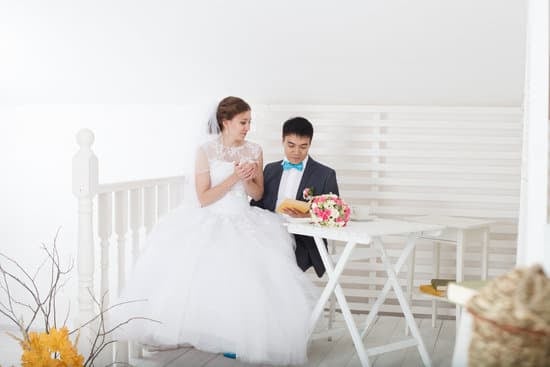Do wedding thank you cards need to be handwritten? In the digital age, the significance of handwritten notes is often questioned. However, in the context of weddings, the personal touch and emotional connection created by personalized messages cannot be overstated. From etiquette and tradition to practicality and cost considerations, there are various factors to consider when deciding whether or not to handwrite wedding thank you cards.
Wedding thank you cards hold great importance as they allow the couple to express gratitude to their guests for sharing in their special day. The impact of personalization cannot be understated, as it creates a lasting impression on those who receive them. In a world dominated by technology, handwritten notes stand out as a thoughtful and intimate gesture, conveying genuine appreciation.
As we delve into the significance of handwritten thank you cards in the digital age, it becomes important to explore how customization and personal touch play a vital role in connecting with guests on a deeper level. The emotional connection created by personalized messages resonates with recipients in a way that printed or digital alternatives simply cannot replicate.
The Significance of Handwritten Cards in the Digital Age
In a world where digital communication has become the norm, the value of handwritten notes, especially in the context of wedding thank you cards, cannot be overstated. The personal touch and effort put into crafting a handwritten message carries a significance that surpasses the convenience of sending a quick email or text.
When it comes to expressing gratitude to your wedding guests, taking the time to write a personalized note demonstrates thoughtfulness and appreciation in a way that digital messages simply cannot replicate.
Here are some reasons why handwritten thank you cards hold significant value in the digital age:
- Personalization: Each handwritten note can be tailored to reflect the specific gift or act of kindness from the recipient. This level of customization adds an emotional connection and lets your guests know that their presence at your wedding was truly meaningful.
- Emotional impact: Handwritten notes have a charm and intimacy that digital messages lack. The tactile experience of receiving and opening a physical card is more likely to create a lasting impression and evoke positive emotions.
- Timeless tradition: Among all the modern advancements, the tradition of sending handwritten thank you cards remains timeless. It reflects etiquette, thoughtfulness, and consideration for others’ generosity.
Ultimately, while technology offers convenience, it cannot replace the meaning and impact of handwritten sentiments in expressing gratitude for your wedding gifts and attendees. As we navigate through this digital age, preserving the tradition of sending handwritten thank you cards can create lasting memories and strengthen personal connections with your loved ones.
Customization and Personal Touch
In a world that is increasingly dominated by technology and digital communication, the value of handwritten notes and personalized messages cannot be understated. When it comes to wedding thank you cards, the impact of customization and personal touch is immense. Taking the time to personalize each message shows thoughtfulness and consideration, creating a deeper emotional connection with the recipient.
When you handwrite a thank you card, you have the opportunity to tailor your message to each individual guest. You can express your gratitude for their presence at your special day, reminisce on shared memories, or simply convey how much their support means to you. This level of customization makes each card unique and meaningful, leaving a lasting impression on the recipient.
The emotional connection created through handwritten, personalized messages extends beyond just expressing gratitude. It also serves as a sincere gesture that shows your guests how much they are truly appreciated. By taking the time to craft a thoughtful message, you are not only conveying your thanks but also demonstrating your genuine care for each person who celebrated with you on your wedding day.
- Handwriting thank you cards allows for personalization
- Tailoring messages to individual guests creates a meaningful and lasting impression
- Personalized messages serve as a sincere gesture of appreciation
Etiquette and Tradition
The tradition of handwritten thank you cards in the context of weddings has been a long-standing etiquette that many couples adhere to. This tradition stems from the idea that personalized, handwritten notes convey a deeper sense of gratitude and appreciation to wedding guests.
Handwritten thank you cards are seen as a way for couples to connect on a more personal level with their guests, showing that they took the time and effort to acknowledge the presence and gifts of each individual.
There is an expectation within wedding etiquette that thank you cards should be handwritten, as it is widely perceived as more thoughtful and sincere than printed or digital alternatives. Many wedding guests appreciate the effort put into a personalized note and consider it a reflection of the couple’s gratitude for their attendance and support. The act of sitting down and personally writing out messages to each guest carries emotional significance in expressing genuine thanks.
While it may seem like a daunting task, especially after planning a wedding, adhering to this traditional expectation can leave a lasting impression on guests. However, considering the challenges such as time management and practicality associated with writing personalized notes for a large number of guests, some couples may opt for alternatives.
These alternatives may include enlisting help from friends or family members, using calligraphy services, or even utilizing modern printing technologies that can simulate handwriting for a more personal touch.
| Topic | Discussion |
|---|---|
| Importance of Tradition | The tradition of handwritten thank you cards in weddings conveys deeper gratitude. |
| Expectation within Wedding Etiquette | Handwritten notes are perceived as more thoughtful and sincere by wedding guests. |
| Challenges and Alternatives | Couples may consider enlisting help or using modern printing technologies due to practicality challenges. |
Practicality and Time Management
In the midst of wedding planning and post-wedding bliss, the task of writing personalized thank you cards can often feel overwhelming. Traditionally, handwritten thank you cards have been the expectation in expressing gratitude to wedding guests. However, in today’s digital age, many couples are faced with the challenge of managing this task amidst their busy schedules. The question remains: do wedding thank you cards need to be handwritten?
With the average number of guests at a wedding ranging from 100-150, the thought of individually writing out messages for each attendee can seem daunting and impractical. As a result, couples may find themselves seeking alternatives to express their appreciation while also saving time and effort. While handwritten notes hold sentimental value, there are other ways to personalize thank you cards without sacrificing too much time.
One alternative to consider is utilizing personalized stationery with a pre-printed message expressing gratitude for the guest’s attendance and any gifts received. This allows for a thoughtful touch without needing to handwrite each individual note. In addition, couples can also opt for electronic thank you notes or printed photo cards that include a personalized message. These options provide practical solutions for expressing gratitude while navigating time constraints.
The decision on whether wedding thank you cards need to be handwritten ultimately comes down to personal preference and practicality. While handwritten notes carry a special touch, couples should not feel pressured into this traditional practice if it proves unmanageable within their busy schedules. It is important to consider the alternatives available and find a method that best suits their needs while still effectively communicating appreciation to their guests.
| Handwritten Thank You Cards | Alternatives |
|---|---|
| Hold sentimental value | Personalized stationery with pre-printed message |
| Time-consuming for large number of guests | Electronic thank you notes or printed photo cards |
Cost Considerations
In today’s digital age, the cost of preparing and sending wedding thank you cards can add up. Handwritten notes demand time and attention to detail, which can make them more costly than printed or digital alternatives. However, the question remains: do wedding thank you cards need to be handwritten? Let’s explore the financial implications of each option.
Handwritten Cards
While handwritten cards are perceived as personal and thoughtful, they can be more expensive due to the time and effort required to write them. Additionally, the cost of quality stationery and postage must be factored into the overall expense. For couples with a large guest list, this process can become overwhelming and costly.
Printed or Digital Alternatives
Printed or digital thank you cards are often less expensive than their handwritten counterparts. With various online platforms offering customizable templates at affordable prices, couples may find it more cost-effective to opt for this alternative. This option also allows for easier management of a large guest list without sacrificing personalization.
Considerations for Cost-Effective Solutions
Couples should weigh their budget constraints against the desire for personalized thank you cards. There are many ways to cut costs without compromising on sentimentality – such as opting for postcards instead of traditional folded notes, utilizing free design resources online, or even hand-delivering thank you cards when possible.
Ultimately, selecting the right option boils down to a couple’s preferences and financial considerations when determining whether wedding thank you cards need to be handwritten. While tradition suggests that handwritten notes carry greater emotional impact, modern-day practicalities may call for alternative solutions that offer both personalization and cost-effectiveness.
Guests’ Perspectives
When it comes to receiving a thank you card, especially after attending a wedding, guests often appreciate the personal touch of a handwritten note. The effort and time taken to write a personalized message can make the recipient feel truly valued and acknowledged. In an age where digital communication prevails, receiving a physical, handwritten card holds sentimental value and can leave a lasting impression on the recipient.
The Emotional Impact
Receiving a handwritten thank you card from the newlyweds can evoke feelings of warmth and appreciation in guests. Knowing that the couple took the time to personally express their gratitude can leave a positive impact and create a sense of connection between the sender and recipient. Guests often treasure these tokens of appreciation as tangible mementos from such a special occasion.
The Personal Connection
Handwritten thank you cards add a personal touch that goes beyond mere words. It allows the couple to convey their emotions and sentiments in their own handwriting, making the message more intimate and meaningful. This personal connection can strengthen relationships with guests as it shows that their attendance at the wedding was truly cherished by the couple. Overall, guests tend to feel more valued and connected when they receive handwritten thank you cards.
Ultimately, while some couples may face challenges in writing personalized notes for all their wedding guests, it is clear that handwritten thank you cards hold great significance for recipients. The emotional impact, personal connection, and overall appreciation conveyed through such gestures make them an essential element in expressing gratitude after tying the knot.
Conclusion
In conclusion, the debate on whether wedding thank you cards need to be handwritten is one that encompasses various factors. It is clear that personalized messages hold significant value, especially in the digital age where handwritten notes are becoming increasingly rare. The personal touch and emotional connection created by a handwritten thank you card cannot be understated, and it stands as a tradition deeply rooted in etiquette.
While there may be practical challenges and cost considerations associated with handwriting numerous thank you cards, the potential benefits of doing so should not be overlooked. The effort put into crafting personalized messages for each guest can leave a lasting impression and show genuine gratitude for their presence and support on your special day. Furthermore, considering guests’ perspectives on the matter highlights the significance they place on receiving a handwritten thank you card.
In essence, while there may be alternatives to handwritten thank you cards, such as printed or digital options, it is evident that the personalization and emotional impact of handwriting these notes are worth the time and effort. Ultimately, when it comes to showing appreciation for your wedding guests, there is immense value in delivering a heartfelt message through a handwritten thank you card.
Frequently Asked Questions
Should You Handwrite Wedding Thank You Cards?
Handwriting wedding thank you cards adds a personal touch that recipients often appreciate. It shows that you took the time to individually address and express gratitude, which can make your guests feel truly valued.
Do You Have to Write Wedding Thank You Notes?
Yes, it is customary to send wedding thank you notes to express your appreciation for the gifts and support received from guests. It demonstrates good manners and acknowledges the generosity of those who celebrated with you on your special day.
Do Thank You Notes Have to Be Hand Written?
While there is no strict rule stating that thank you notes must be hand written, doing so conveys thoughtfulness and sincerity. However, typed or printed thank you cards are also acceptable, especially if it is more practical for certain situations such as large guest lists.

I have been involved in marriages for over 20 years helping couples and singles understand more about them.





